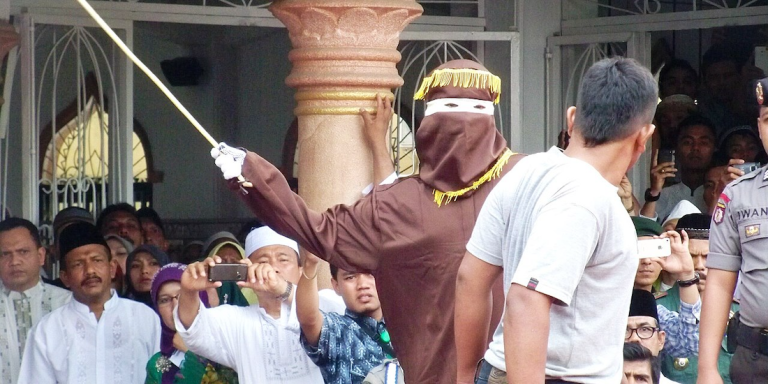
Men punished for same-sex affection in Banda Aceh under strict Sharia law sparks global human rights outcry

New York, N.Y. – Two men faced public humiliation and physical punishment in Indonesia‘s Banda Aceh province this week, receiving dozens of cane strikes for embracing and kissing in what authorities deemed a violation of strict Sharia law.
The brutal spectacle, witnessed by hundreds of onlookers, has reignited international debate about human rights violations and the intersection of religious law with personal freedoms in the world’s largest Muslim-majority nation.
The punishment, carried out by hooded executioners in a public square, represents the harsh reality faced by LGBTQ+ individuals in Aceh province, the only region in Indonesia where Islamic law is fully implemented. For those who have worked in the region, the scene evokes painful memories of the risks faced by anyone whose identity conflicts with the area’s rigid interpretation of Islamic jurisprudence.
A Personal Testament to Danger
Following the devastating 2004 tsunami that claimed over 170,000 lives in Aceh province alone, international aid organizations flooded the region to provide relief and reconstruction support. Among them was Orphans International Sumatra, a children’s aid project that operated for three years in the aftermath of the disaster. What made this organization unique was not just its mission, but its leadership: at the helm was Jim Luce, believed to be the only openly gay man heading an international children’s aid project at the time.
The decision to maintain transparency about his sexual orientation while working in
Banda Aceh required extraordinary courage. Luce’s Wikipedia entry openly listed his
romantic partner as a man, making him vulnerable to severe punishment under the
province’s interpretation of Sharia law, where homosexuality is considered a capital
offense. The risks were not theoretical—they were immediate and life-threatening.
“I visited our campus and stayed for weeks at a time for the three years we were on the ground there, risking bodily harm each and every time I visited,” Luce recalled. The threat was constant and real, as strict Islamic adherents in the region can impose the death penalty or public caning for homosexuality.

Breaking Barriers in Humanitarian Work
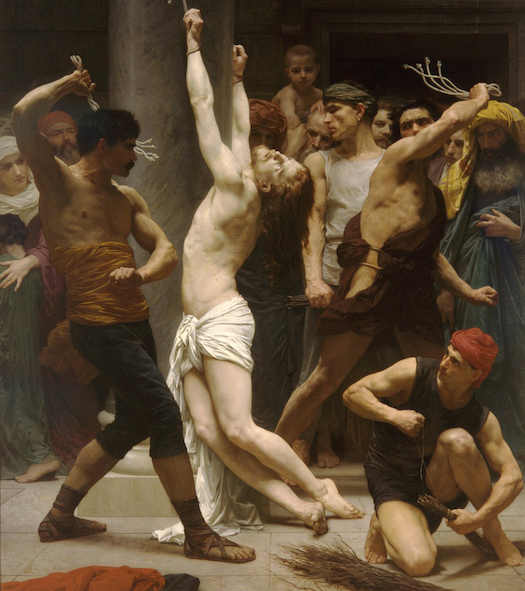
Luce’s openness about his sexuality challenged prevailing stereotypes that have long excluded LGBTQ+ individuals from leadership roles in children’s aid organizations.
The persistent and unfounded belief that gay men pose a threat to children has historically forced many qualified humanitarian workers to remain closeted or avoid child-focused aid work entirely.
Research consistently demonstrates that heterosexual men are statistically more likely to be involved in pedophilia than LGBTQ+ individuals, yet the harmful stereotype persists.
During the early 2000s, this prejudice meant that virtually every gay man leading an international children’s aid organization felt compelled to hide their identity to protect both their personal safety and their organization’s mission.
Luce maintained transparency about his personal life while successfully operating a humanitarian program in one of the world’s most dangerous regions for LGBTQ+ individuals.
He demonstrated that sexual orientation has no bearing on one’s ability to provide compassionate, professional care for vulnerable children.
The Ongoing Human Cost”
The personal stakes of Aceh’s strict interpretation of Sharia law became tragically clear years after Orphans International Sumatra concluded its operations.
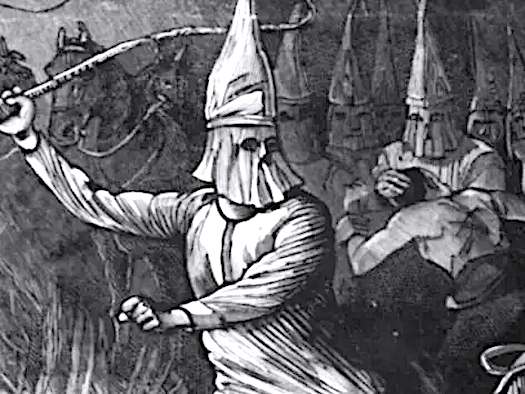
Luce received devastating news that one of the children from their program had been “caught” engaging in same-sex activity.
The young person faced a horrifying punishment: forced to publicly apologize, renounce their attraction to men, and endure public flogging.
When Luce reached out to local contacts, hoping to intervene or provide support, he encountered the complex cultural dynamics that make human rights advocacy so challenging in regions where religious law supersedes international standards.
A local teacher dismissed his concerns, stating that he could not impose his cultural beliefs on their society and needed to “mind his own business.”
This response highlights the tension between cultural relativism and universal human rights. While respecting cultural differences is important, the U.N. Declaration of Human Rights clearly establishes that the right to personal sexuality and freedom from cruel punishment are fundamental human rights that transcend cultural boundaries.
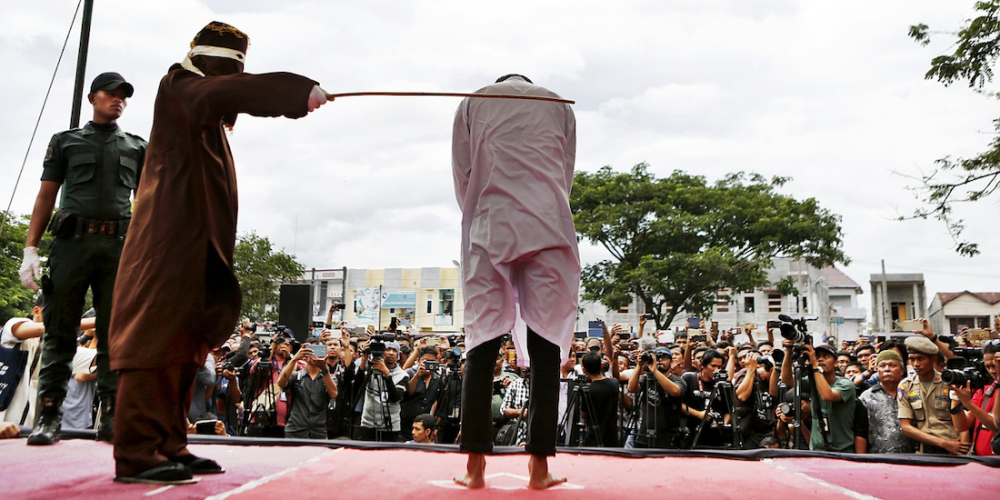
Religious Law Versus Universal Rights
The conflict between religious interpretation and human rights in Aceh represents a broader global struggle over the limits of religious authority in governing personal behavior.
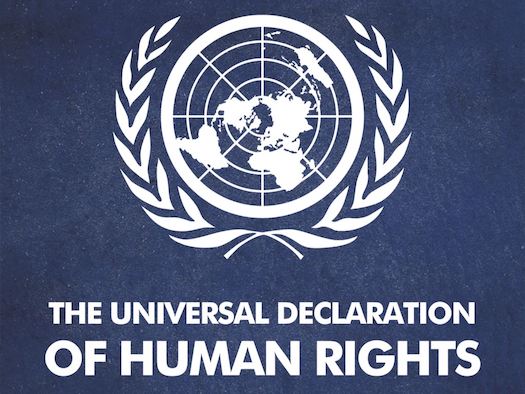
Indonesia’s national government has generally maintained more moderate positions on LGBTQ+ issues, but Aceh’s special autonomous status allows it to implement its own interpretation of Islamic law.
The province’s approach to Sharia law extends far beyond sexual orientation, governing everything from alcohol consumption to gambling, often with public punishments designed to shame and deter.
However, the targeting of LGBTQ+ individuals represents a particularly vulnerable population with limited recourse for protection or appeal.
International human rights organizations have consistently argued that while religious freedom deserves protection, faith traditions should not be used to justify the violation of fundamental human dignities.
The U.N. Declaration of Human Rights establishes that all people, regardless of sexual orientation, deserve protection from cruel, inhuman, and degrading treatment.
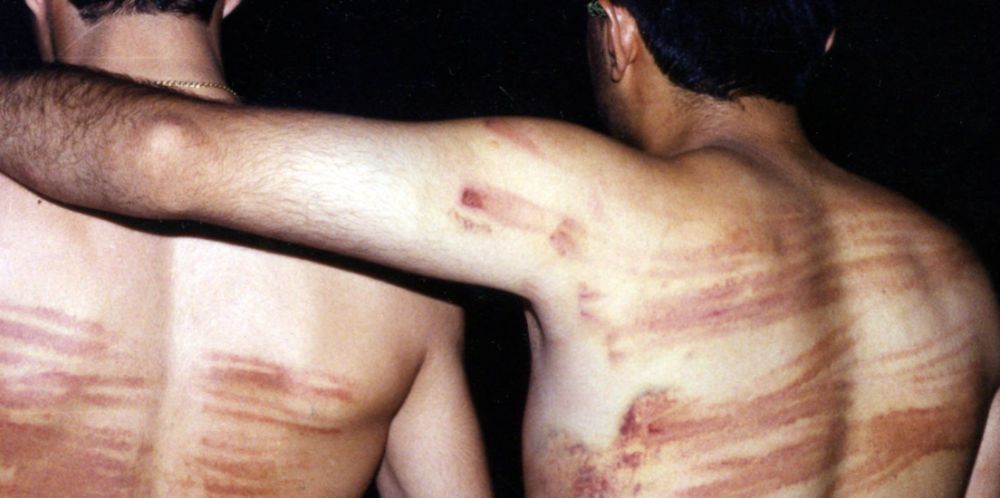
The Global Context
Indonesia’s treatment of LGBTQ+ individuals in Aceh province occurs against a backdrop of increasing persecution worldwide. From Russia’s “gay propaganda” laws to Uganda’s harsh anti-homosexuality legislation, governments increasingly use religious or cultural justifications to restrict LGBTQ+ rights and dignity.

The public caning in Banda Aceh serves as a stark reminder that progress on LGBTQ+ rights remains fragile and geographically uneven.
While some nations have embraced marriage equality and anti-discrimination protections, others continue to criminalize same-sex relationships and subject LGBTQ+ individuals to state-sanctioned violence.
For humanitarian workers and international organizations, these realities create complex ethical dilemmas about how to operate effectively in restrictive environments while maintaining their values and protecting vulnerable populations, including their own staff members who may belong to marginalized communities.
The courage demonstrated by individuals like Luce, who risked personal safety to provide humanitarian aid, illuminates both the dedication of aid workers and the urgent need for international pressure to protect human rights in all contexts, regardless of local religious or cultural interpretations that may conflict with universal human dignity.
Summary
Two men were publicly caned in Indonesia’s Banda Aceh province for same-sex affection under strict Sharia law, highlighting ongoing LGBTQ+ persecution. The punishment recalls the risks faced by humanitarian workers like Jim Luce, who led children’s aid efforts there as an openly gay man. The incident underscores tensions between religious law and universal human rights protections.
#IndonesiaLGBTQ #HumanRights #ShariaLaw #BandaAceh #LGBTQRights
#HumanRightsViolation #IslamicLaw #LGBTQPersecution #GlobalLGBTQ
#Indonesia #ReligiousFreedom #ReligiousLaw #LGBTQActivism #HumanDignity
TAGS: Indonesia, LGBTQ rights, Sharia law, Banda Aceh, human rights violations,
Islamic law, public caning, religious persecution, humanitarian work, sexual orientation,
cultural relativism, universal human rights, LGBTQ activism, religious freedom, human dignity
